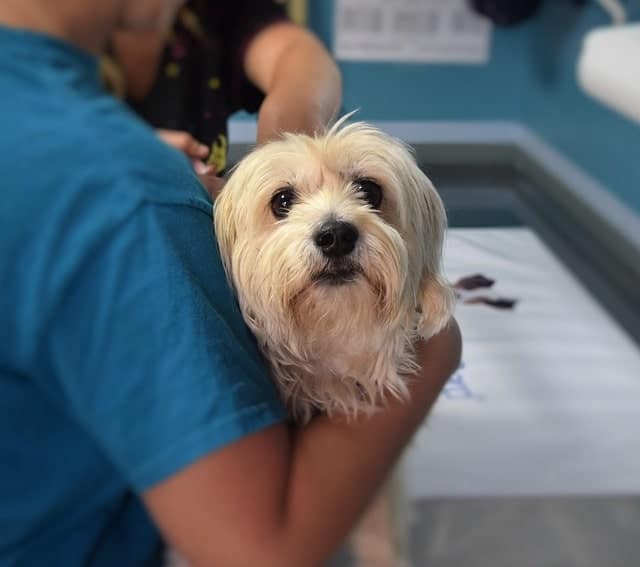
If you are a first time dog owner, there is a lot to learn. Getting a dog is a very exciting time, but it can also be very overwhelming at first. As a veterinarian, I often get questions from new pet owners about how to best care for a new dog. These are the 12 tips that I give to first time dog owners to ensure that your pup stays happy and healthy.
1. Find a Good Veterinarian
My biggest recommendation for first time dog owners is to find a good veterinarian. You will want to bring your new dog into the vet clinic for a check-up shortly after you adopt them. Your veterinarian will make sure that your pet is up to date on all vaccines. Your vet will also provide individualized health recommendations for your dog. It’s also good to know where the nearest emergency veterinary hospital is so you’ll know where to take your pup if there is an emergency.
2. Feed a High-Quality Pet Food
It’s important to feed your dog high-quality pet food from a reputable company. My favorite pet food companies include Hill’s Science Diet, Royal Canin, and Purina Pro Plan. Look for a diet that is appropriate to the life stage that your dog is in. Puppies will need high-quality puppy food for the first year of life. Additionally, feed a diet that is appropriate to the breed size that you have. For example, an adult German Shepherd should receive large breed adult maintenance food.
3. Provide Consistent Training

When you first get your new pet, make sure that you are teaching them basic commands. Consistent training is good for a dog’s mental stimulation. Consider enrolling your dog in a training class or hiring a trainer to help you train your dog. Positive reinforcement such as giving treats to reward your pet for good behavior is the best way to train your dog. Some trainers may recommend that you use training collars to train your dog.
4. Develop Routines
Dogs love routines! Routines provide structure to your dog’s day, so I recommend establishing a consistent routine so your pet knows when it is time for bed, time for breakfast, and time for a walk. Consistent routines can be helpful for your dog’s mental health and may decrease symptoms of anxiety in your pet.
5. Get Your Pet Microchipped
When you get a new dog, make sure you get them microchipped. A microchip is a tiny transponder that can be implanted under your dog’s skin. The microchip can be registered to your name and contact information. If your pet ever gets lost and taken to an animal shelter, they will be scanned for a microchip. If you have had your pet microchipped, there is a higher chance that your dog will be returned safely to you. Microchips are very affordable and can be done at most veterinary clinics.
6. Vaccinate Regularly

Many infectious diseases can make your dog very sick. Be sure that you are vaccinating your pet regularly for the most common dog diseases such as rabies, distemper, parvovirus, and leptospirosis. Your pet may also need to be vaccinated for canine influenza and bordetella if they visit the dog park or go to boarding or grooming facilities.
7. Give Monthly Flea and Heartworm Prevention
Heartworms and fleas are extremely common parasites that can infect your dog. I recommend that all dogs be given monthly flea prevention and heartworm prevention. The treatment for heartworms is extremely pricey and can range from $500 to $2000. Heartworm prevention is usually very affordable and should be given every month to protect your pup from this potentially fatal disease.
8. Dog Proof Your Home
Before your dog arrives home, make sure you dog-proof your home. Put any medications on a high shelf in a separate room that your dog does not have access to. In addition, make sure your counters are clean so your pet doesn’t snatch food or snacks off of the counter. You might even consider crate training your dog so that you can be sure that they don’t get into trouble while you’re out of the house.
9. Exercise Regularly
To keep your pup healthy, be sure you are regularly exercising them. A daily walk can be good for both you and your dog. Consider regularly playing fetch in the yard or taking your dog for a jog. Regular exercise will often decrease unwanted or annoying dog behaviors.
10. Regular Grooming

Don’t forget to regularly bathe and brush your dog. Most dogs only need to be bathed once every month or two, although it varies based on your dog’s breed, coat type, activities, and other factors. Find a good shampoo for your pup that will leave your pet smelling fresh and clean. Some dogs will need to be taken to a groomer for regular hair cuts. Also, don’t forget to trim your dog’s nails about once a month, or anytime your pup’s nails are about to touch the floor when they walk.
11. Consider Purchasing Pet Insurance
Pet insurance can be a life-saver. If you want to ensure that you will always be able to financially care for your pup, I recommend purchasing a pet insurance plan. Some pet insurance plans will cover vaccine costs and medical care, while other plans are just for medical expenses. Do your research to find what plan will best fit your situation.
12. Brush the Teeth or Daily Dental Treats
Dental health is extremely important in ensuring that your pup lives a long and healthy life. If your dog will let you, I recommend brushing the teeth daily with a dog-specific toothpaste and a soft-bristled toothbrush. If your dog will not let you brush its teeth, I recommend feeding a dental treat daily. Your pet may also need dental cleanings from the veterinary clinic periodically.






